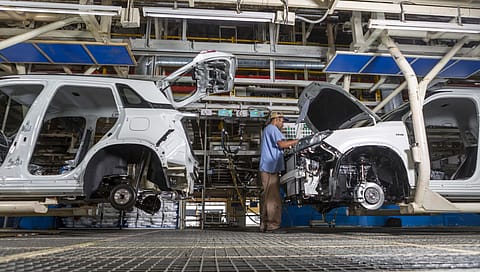Cars get expensive as Maruti Suzuki hikes prices across models
Maruti’s decision to hike prices comes after similar moves by Tata Motors and Hyundai; the price hikes, rising input costs, and the shortage of key materials have dealt a blow to the auto industry

After four hikes in the past year, India's largest carmaker Maruti Suzuki has again decided to increase prices of its entire model range due to rise in various input costs. Maruti has said the price hike will be implemented from this month and will vary for different car models.
"Over the past year, the cost of Company's vehicles continue to be adversely impacted due to increase in various input costs. Therefore, it has become imperative for the Company to pass on some impact of the above additional costs to customers through a price hike. We have planned this price rise in April, 2022. The increase shall vary for different models," Maruti Suzuki said in a stock exchange filing.
In its statement today, Maruti has not revealed the quantum of the proposed price hike. The current announcement comes after repeated hikes announced last year. From January 2021 to March 2022, Maruti has already increased prices by around 8.8% primarily due to increase in input costs.
Maruti’s decision to hike prices follows similar moves by competitors like Tata Motors and Hyundai. The rise in input costs and shortage of key components like semiconductors have forced major auto companies to raise prices to balance out their business dynamics.
Homegrown auto giant Tata Motors had last month announced an increase in prices of its commercial range by up to 2.5%, following its decision to hike prices for its passenger cars in January. The PV category had seen up to 0.9% hike, with effect from January 19.
Likewise, South Korean auto giant Hyundai had also announced a price hike for popular SUVs like the Venue, Creta and the Alcazar by up to Rs 22,000 in January. Its other lineup of hatchbacks also saw price hikes by up to Rs 17,400. Even the premier car companies have also resorted to price hikes. Mercedes-Benz has announced that it'll increase the prices of its models by up to Rs 5 lakh from April 1.
Declining sales hurting recovery
Recommended Stories
On YoY basis, total vehicle retail for the month of March 2022 decreased by -3% and -30% when compared to March’20 (the month when all India lockdown was announced), the Federation of Automobile Dealers Associations (FADA) said in its latest vehicle retail data released in March 2022. FADA provides monthly insights on the sale of vehicles by auto dealers.
On the production side, the latest data put out by the Society of Indian Automobile Manufacturers on March 12 showed passenger vehicle wholesales declining 6.54% in February. Two-wheelers sales also saw a massive plunge at 27.2% on YoY basis in February. SIAM provides insights on wholesale data of vehicles dispatched from factories.
FADA President Vinkesh Gulati has said the overall full recovery is yet to be seen as auto retails are down by -25% when compared to FY20, which was largely a pre-covid year and a year of BS4 to BS-6 transition.
Rajesh Menon, Director General, SIAM said continuing supply side challenges like semiconductor shortages, increase in cost due to new regulations, higher commodity prices, higher logistics cost etc. have impacted overall sales in the auto industry. "Industry is closely watching the possible impact of the on-going conflict in Ukraine, as global supply chains could come under stress,” he said.
(INR CR)
Factors ailing India’s auto industry
The price hikes, rising input costs, and the shortage of key materials have dealt a blow to the auto industry. There was a 3% decline in new vehicle registrations with the RTO (regional transport offices) in March 2022. Most high volume categories, two-wheeler, passenger cars and tractors, saw a decline in new registrations. Among the three categories, the demand has been stronger for passenger vehicles, though the shortage of semiconductors has disrupted the supply chains.
In addition to these factors, the ongoing war between Russia and Ukraine and the resurgence of the Covid-19 wave in China's key cities, the U.K. and U.S. could also play a big role disrupting supply lines. Companies are already delaying the delivery of popular car models by many months, adding to the frustration of customers.